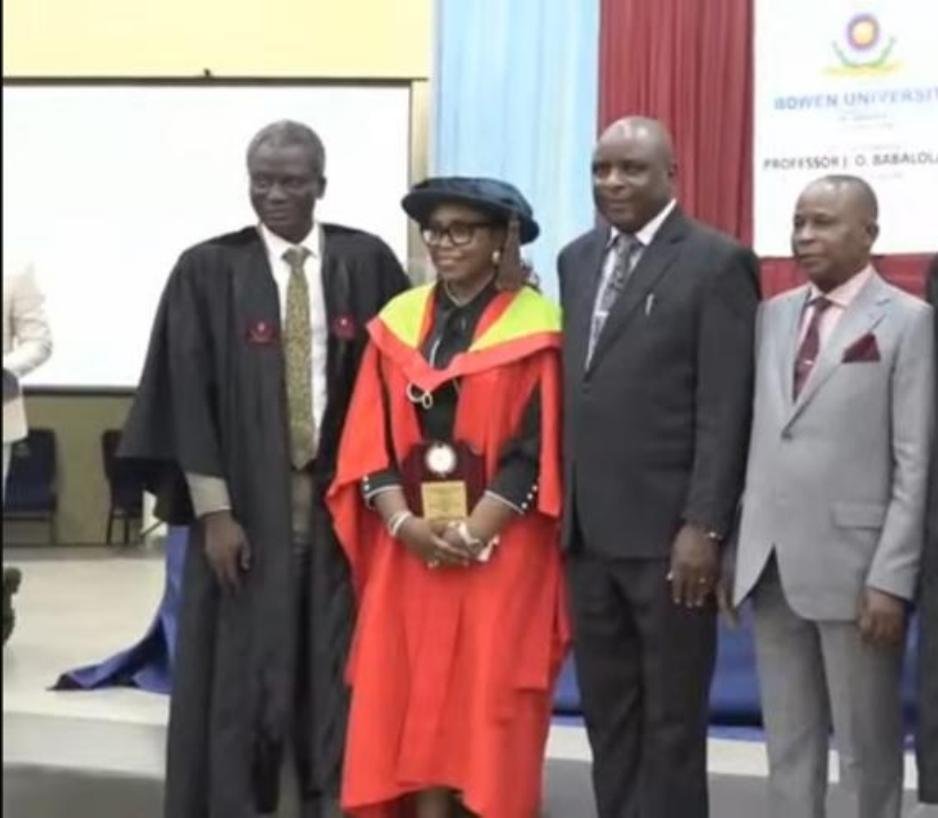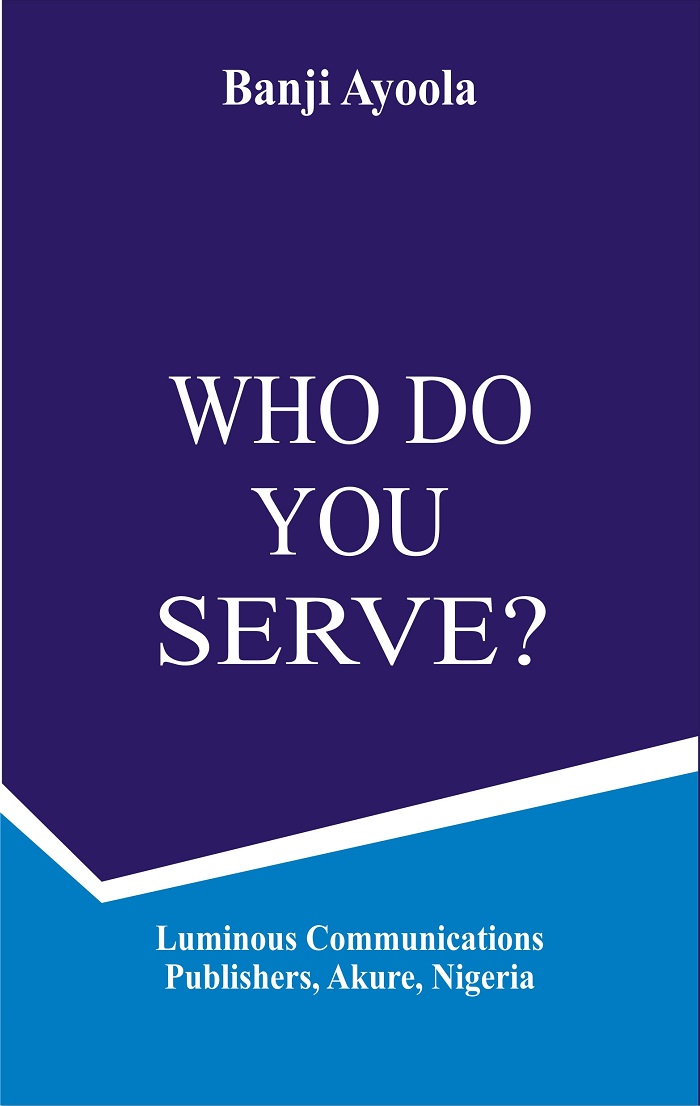Right to Left: Attorney General of the Federation and Minister of Justice, Prince Lateef Fagbemi, SAN; Head, Temitope Chambers, Oloye Seun Ajayi; Inaugural Lecturer, Prof. Mary-Ann Ajayi; and VC, Bowen University, Iwo, at the University’s 22nd Inaugural Lecture delivered by Prof. Ajayi on Thursday, May 28, 2025
- AGF Fagbemi commends lecturer for noting judiciary’s efforts protecting rights of the vulnerable
- says Tinubu trying to represent all interests in governance
By Our Reporter
A Professor of Law at Bowen University, Iwo, in Osun State, Prof. Mary-Ann Ajayi has called for an urgent customary laws reform to blend with modern trends as basis for a new justice system.
Delivering the University’s 22nd Inaugural Lecture on Thursday, she stressed the need for a balanced system that strikes a healthy balance between customary laws with the realities of contemporary human rights laws in Africa.
Titled: “The paradox of customary law and human rights in Africa: Exploring the tensions, complementarities and opportunities for reform”, the lecture was themed around the tension between tradition and rights, the need for systemic reform of various customary laws, and the call for introspection within advocacy movements.
Prof Ajayi held her audience, drawn from the academic, legal, religious, traditional and policy-making spheres, that filled the University’s 1,500-capacity hall, spell-bound, as she dazzled them with her findings from what was convincingly an extensive, authoritative, a robust, well-researched, compelling, powerful, and classic study.
The lecture, both a remarkable roadmap and passionate rallying cry for a more just society, bridged the undesirable divide between tradition and human rights to make recommendations that will undoubtedly always ensure equity, accountability, inclusivity, and indiscriminate justice for all the societal component groups.
In particular, she stressed an urgent need to replace the one-sided, and skewed justice system prevailing in African countries with a well-rounded, and balanced approach, which simultaneously respects cultural traditions, and ensures compliance with the contemporary realities of human rights principles.
She condemned the widespread efforts in some unenlightened quarters in the prevailing skewed legal system to disparage, dismiss, and demonise customary laws as archaic or fetish, as a warped, and an unacceptable misrepresentation.
She insisted that African customary laws are neither archaic, nor fetish as being wrongly labelled in some quarters, but like everything else on Earth today, the traditional laws need a total renewal to conform with modern realities to better serve the needs of the people.
Declaring authoritatively, the erudite scholar stressed that: “Many of these (customary) laws are not archaic in the sense of the word, but it is just that in line with the contemporary human rights laws, they are no longer obtainable.
“Some of them actually have rich, historical, perspectives.
“We now educate the people on how to turn around the law in line with the contemporary human rights laws”
However, Prof. Ajayi noted that there is a need to finetune some aspects of the customary laws to harmonise with the realities of contemporary human rights laws.
On the emotive issue of gender marginalisation that featured prominently in the lecture, she admitted that some aspects of customary laws appeared skewed against women interest.
However, she advised that it is wise to consider the enriching philosophy and wisdom behind them before making a narrow, one-sided, and sweeping condemnation of such laws.
In her words: “For example, look at the Benin customary law that says the eldest son has the right to inherit the father’s property.
“If you look at it, some human rights activists will say what about the daughters, why are you leaving aside the daughters?
“But the underpinnings behind that law is not to exclude the daughters. It’s because there should be continuity.
“The son has to step into the role the father used to occupy and then take care of not just the assets but the liabilities as well.”
She made far-reaching recommendations that emphasises extensive, rigorous, honest, constructive, and productive engagement among stakeholders, to ensure that the expected success of the proposed strategic fine-tuning of the customary laws is reasonably achieved.
These, among others, include embarking on legal and judicial reforms, empowering the vulnerable groups, enhancing people’s access to justice, and promoting education and public awareness.
Also, the scholar stressed the need for multi-stakeholder collaboration, partnerships between governments, traditional leaders, Non-Governmental Organisations, and international bodies to drive the suggested review for a sustainable change.
Besides, she harped on the need to monitor and evaluate the proposed interventions to ensure that the recommended awareness campaigns and legal reforms are effective.
Challenging the various governments of African countries to act now, Prof Ajayi declared: ‘The journey toward justice is not about erasing culture but refining it to reflect the dignity of all people”.
In his remark, the Attorney General of the Federation and Minister of Justice, Prince Lateef Fagbemi, commended the lecturer for acknowledgin the efforts being made by the judiciary to protect the rights of the vulnerable in Nigeria.
However, he said that all citizens must play their expected roles to ensure the respect of all their rights within the confines of the nation’s Constitution.
Fagbemi informed that his principal, President Bola Ahmed Tinubu, is making frantic efforts to ensure that all interests are well represented in the scheme of things in his administration of the country.
For instance, he said that the President gives prominent role to the women appointees serving in his government to ensure that they are not marginalised.
The University’s Vice Chancellor, Prof. Jonathan Babalola, praised the lecturer for doing justice to the topic.
He noted that the University always deposits copies of its inaugural lectures at the National Library to ease access for decision makers, due to the high potentials of scholarly undertakings in enhancing the quality of government policies.
He added that the University also organises periodic public engagements where they interface with stakeholders from different sectors of the nation’s life for ideas on areas that need academic interventions.
A visibly proud and happy husband of the lecturer, Oloye Seun Ajayi (SAN), expressed deep gratitude to the Almighty and Most High for making the day a reality, especially, as it came a day after the celebration of their union’s 20th anniversary.
Recalling how challenging their union’s journey had been especially giving the busy nature of their respective professions, Ajayi said that the comforting fact that they are both lawyers, sharing passion for issues around customary law, has been helping them in their fruitful and joyful journey together.







